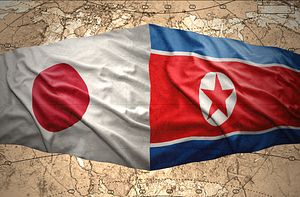On Thursday, Japan and North Korea agreed that they would hold formal high-level talks for the first time in over a year, according to Japan’s Jiji news agency. So far, neither side has publicly declared any agenda for the talks. The agreement to hold high-level talks was a byproduct of an informal diplomatic meeting between Japanese and North Korean diplomats and Red Cross officials in Shenyang, China. The Japanese delegation is expected to be led by Junichi Ihara, head of the Foreign Ministry’s Asian and Oceanian Affairs Bureau. Song Il Ho, a DPRK official in charge of Japanese affairs and ambassador for talks to normalize bilateral relations, will lead the North Korean delegation, according to The Japan Times.
Japanese Prime Minister Shinzo Abe noted at a press conference that the talks with North Korea are an “important step” and that he’d “like to resume talks as soon as possible.” After North Korea fired a long-range rocket over Japan in late 2012, the Japanese side suspended all formal talks. In addition to pursuing bilateral efforts with North Korea, Japan is a member of the Six-Party Talks on North Korea’s nuclear weapon program — a diplomatic effort that came to a halt in 2008 although it is appearing on the radar again this year thanks to efforts by Chinese and North Korean officials alike.
As far as an agenda goes, it is likely that Japan will come to the negotiating table with it’s usual requests and concerns. Of primary importance for Japan is the repatriation of the remains of Japanese soldiers who died on North Korean territory at the end of the Second World War in addition to several Japanese citizens who were abducted by agents of the North Korean government in the late 1970s and early 1980s. The abduction issue is a serious and seemingly intractable feature of bilateral relations between North Korea and Japan, having remained unresolved for decades. Japan has hinged its compliance with the terms of the Six-Party Talks on the possible resolution of the abduction issue with North Korea via diplomatic channels. The abduction issue is particularly sensitive for Shinzo Abe, who has declared it a priority. At the upcoming talks, Japan will broach the issue of North Korea’s nuclear program as well.
For North Korea, the decision to agree to bilateral talks might indicate a willingness to bring certain concessions to the table with the interest of reaping economic rewards. So far, there are no signals this is the case, but Japan’s willingness to provide economic assistance in exchange for cooperation on the abduction issue hasn’t gone unnoticed by Pyongyang. Pyongyang may also be using this as an opportunity to test the diplomatic waters with Japan.
The advent of talks between North Korea and Japan sheds some light on Tokyo’s relative regional isolation considering it hasn’t held high-level talks with either China or South Korea in a long time. In the case of China, no high-level diplomatic negotiations have taken place in over 16 months now. Japanese, South Korean, and Chinese representatives will be attending the Nuclear Security Summit next week in The Hague and it is possible that Japan will attempt to meet with its neighbors during that event. In general, new Japanese prime ministers speak with their South Korean counterparts during their first year in office — this is something that Park Geun-hye and Shinzo Abe have not done yet, highlighting a growing rift between the two northeast Asian neighbors and important U.S. allies.

































